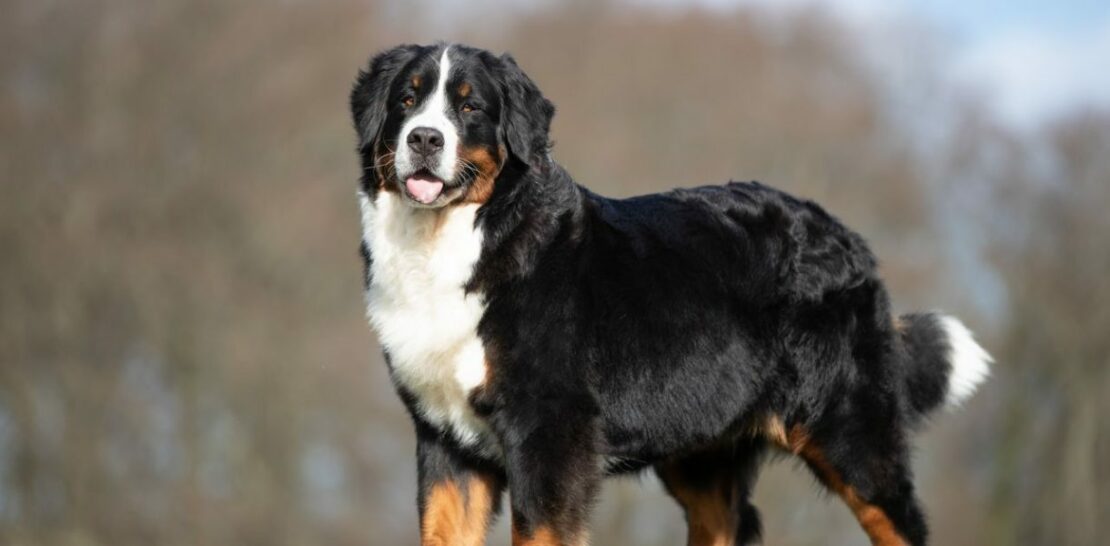From their majestic appearance to their unwavering loyalty, Bernese Mountain Dogs are a breed that has captured the hearts of many dog enthusiasts across the globe.
This comprehensive guide will delve into the fascinating world of the Bernese Mountain Dog, exploring their unique character traits, health considerations, and the essentials of their education.
By the end, you’ll be well-equipped with all the knowledge you need to understand and appreciate these magnificent canines.
A Gentle Giant: The Character of the Bernese Mountain Dog
When it comes to the character of the Bernese Mountain Dog, the phrase “gentle giant” comes to mind. These large, sturdy dogs possess a unique combination of strength, grace, and a loving demeanor that makes them ideal companions for many families.
Temperament and Personality
- Despite their size, Bernese Mountain Dogs are known for their gentle and affectionate nature. They form strong bonds with their families and display a great deal of loyalty and devotion.
- These dogs are generally good-natured, friendly, and social, which makes them great playmates for children and other animals. However, they may be reserved or cautious around strangers until they become familiar with them.
- While they may look imposing, Bernese Mountain Dogs are not generally aggressive. They are usually quite docile and easy-going, with a calm and patient demeanor.
Intelligence and Trainability
- Bernese Mountain Dogs are intelligent and eager to please, making them relatively easy to train. They respond well to positive reinforcement techniques such as praise and treats.
- These dogs have a strong work ethic and enjoy having a job to do. Historically, they were used as farm dogs, pulling carts and herding livestock, so they excel in tasks that involve physical strength and endurance.
- Despite their trainability, some Bernese Mountain Dogs can be stubborn or independent at times. Consistency and patience are key when working with this breed.
Health and Longevity: What to Know About the Bernese Mountain Dog
As with any breed, there are certain health concerns that are more prevalent in Bernese Mountain Dogs. Understanding these issues and taking preventative measures can help ensure your canine companion lives a long, healthy life.
Life Expectancy
On average, Bernese Mountain Dogs have a lifespan of 7 to 10 years. While this may be shorter than some other breeds, a healthy and well-cared-for Bernese can still lead a fulfilling, active life.
Common Health Concerns
There are several health problems that are more commonly seen in Bernese Mountain Dogs, including:
- Hip and Elbow Dysplasia: These hereditary conditions affect the joints and can lead to arthritis and mobility issues. Regular vet check-ups and maintaining a healthy weight can help manage these conditions.
- Cancer: Bernese Mountain Dogs are more prone to certain types of cancer, such as histiocytic sarcoma and malignant histiocytosis. Early detection and treatment are essential for the best prognosis.
- Progressive Retinal Atrophy (PRA): PRA is an eye disorder that can cause blindness. Responsible breeders test for this condition to reduce its prevalence in the breed.
- Bloat: This life-threatening condition occurs when the stomach fills with gas and twists on itself. Feeding smaller meals and avoiding rigorous exercise after eating can help prevent bloat.
Education Essentials: Training and Socializing Your Bernese Mountain Dog
Proper education is crucial for any dog, but especially so for large, powerful breeds like the Bernese Mountain Dog. A well-trained and socialized Bernese is a joy to have as a companion and will be well-equipped to handle various situations and environments.
Basic Obedience and Manners
Start your Bernese Mountain Dog’s education early with basic obedience training, which includes commands like sit, stay, come, and heel. Not only will these skills help your dog become a well-mannered companion, but they can also be lifesaving in certain situations. Positive reinforcement methods, such as treats and praise, are highly effective with this breed.Socialization
Socializing your Bernese Mountain Dog is an essential aspect of their education. Early socialization helps your dog develop confidence and adaptability, reducing the likelihood of fear or aggression toward unfamiliar people, animals, or environments. Expose your Bernese to a variety of situations, such as meeting new people and other dogs, visiting different types of environments, and exposing them to various sounds and experiences. Puppy socialization classes can be a helpful resource for this process.
Advanced Training and Activities
Bernese Mountain Dogs have a strong work ethic and thrive when given tasks to complete. Engaging in advanced training and activities can provide mental and physical stimulation for your dog, as well as strengthen your bond. Some popular activities for Bernese Mountain Dogs include:
- Carting or Draft Work: As a breed historically used for pulling carts, Bernese Mountain Dogs excel in activities that involve hauling weight. Training your dog in carting can be a fun and rewarding activity for both of you.
- Agility: While they may not be the fastest breed, Bernese Mountain Dogs can still enjoy and excel at agility courses. This activity can help improve their coordination, focus, and confidence.
- Therapy Work: With their gentle and affectionate nature, Bernese Mountain Dogs can make excellent therapy dogs, providing comfort and support to those in need. Training and certification are required for this type of work.
Grooming, Exercise, and Nutritional Needs of the Bernese Mountain Dog
Proper care for your Bernese Mountain Dog involves understanding and addressing their specific grooming, exercise, and nutritional needs. By providing your dog with appropriate care in these areas, you will help them maintain a healthy, happy life.
Grooming Requirements
Bernese Mountain Dogs have a thick, double coat that requires regular grooming to prevent matting and excessive shedding. Brush your dog at least once a week, or more frequently during seasonal shedding periods. Additionally, regular nail trimming, ear cleaning, and teeth brushing should be incorporated into their grooming routine.
Exercise Needs
Although they may have a calm demeanor, Bernese Mountain Dogs still require regular exercise to maintain their health and happiness. Aim for at least 30 minutes of moderate exercise daily, such as walks, playtime, or engaging in activities like carting or agility. Keep in mind that their thick coat can make them more prone to overheating, so avoid strenuous exercise in hot weather.
Nutritional Considerations
Feeding your Bernese Mountain Dog a balanced and appropriate diet is essential for their overall health. Look for high-quality dog food that meets their specific nutritional needs, taking into consideration factors such as their age, weight, activity level, and any health concerns. Consult your veterinarian for guidance on the best diet for your individual dog. Additionally, be mindful of portion sizes and avoid overfeeding to prevent obesity, which can exacerbate joint and health issues.
In conclusion, the Bernese Mountain Dog is a majestic breed with a unique combination of strength, grace, and a loving temperament. By understanding their character, health, education, and care needs, you can provide your Bernese with a happy, healthy, and fulfilling life as your loyal companion.




